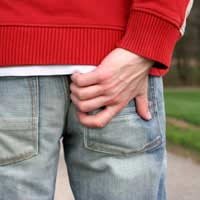Coping With Pruritus Ani

Pruritus Ani can be a real pain in the... Pruritus Ani is the medical term for itching around the anus. The irritation of anal itching or Pruritus Ani is usually accompanied by the uncomfortable and often embarrassing desire to scratch.
Anal itching is magnified by moisture or sweat, and the pressure that is caused by clothing and sitting for any length of time. At it’s least Pruritus Ani is uncomfortable and more than a little embarrassing, at its worst profound anal itching can cause intolerable discomfort, burning and soreness.
Causes of Anal Itching
There are many causes of anal itching or Pruritus Ani. Most of the time Anal itching though uncomfortable, is rarely indicative of a serous disease state. Anal itching is often a result merely of the foods you ingest. The chemicals found in many spices, hot sauces, and peppers, for example can cause anal itching.Bathroom habits can lead to anal itching. Pruritus Ani can be caused by the irritation of frequent soft or liquid stools, or chronic diarrhoea. Fecal incontinence can lead to anal itching.
Anal itching is also sometimes the result of Yeast Infections. Conditions such as Diabetes or HIV that increase the likelihood of yeast infections, as well as treatment with antibiotics can lead to yeast infections around the anal area that can cause anal itching.
Certain skin disorders such as Psoriasis can occur around the anus. Anal itching is also a symptom of Haemorrhoids or Piles, possible parasitic infestation such as pinworms, or anal fissures or skin tags.
Treatments For Pruritus Ani
Since the causes of anal itching can be so varied and it can take time to diagnose and treat the underlying cause, most treatments for Pruritus Ani are directed at reliving the burning and discomfort. Simple anal itching is usually indistinguishable from haemorrhoids or piles, and is therefore treated much the same way.Over-the-counter products used for the treatment of anal itching and or haemorrhoids are available as creams, gels, ointments, suppositories, foams, and pads. No one is any more effective than the other. What you use is a matter of personal preference.
These products vary and usually have one or more types of active ingredients to relive itch and shrink swollen tissues (Vasoconstrictors). Some may also combine that with a local anaesthetic or corticosteroid such as hydrocortisone.
These over-the-counter products will also include a protectant. Protectants prevent irritation of the area by creating a physical barrier on the skin that prevents the effected area from coming into contact with irritating liquid or emissions from the digestive system The barrier prevents further irritation, and decreases itching, burning and pain. Effective and common protectants include:
- Aluminium hydroxide gel
- Cocoa butter
- Glycerin
- Kaolin
- Lanolin
- Mineral oil
- White petrolatum
- Cod liver oil or shark liver oil
If over-the-counter treatment proves ineffective you should seek the advice of a physician. He or she will then take a diagnostic approach to identify an underlying cause for your anal itching. In most cases your doctor can quickly identify the causes of anal itching Usually adjustments in diet, or treatment of diagnosed infections are all that is necessary. In some severe cases surgical procedures may be required to correct the underlying cause of Pruritus Ani.
- Adult Bed Wetting
- Coping With a Speech Impediment
- Coping With Memory Loss
- Coping With Excessive Skin Tags
- What Causes Worms and How are they Treated?
- Frequent Urination and How to Treat it
- Anal Bleeding and What Could be the Cause
- Living With and Treatments for Haemorrhoids
- Herpes and Blisters on the Body
- Dealing With Impetigo
- Loss of Libido
- Treatments for Snoring
- Thrush
- Types of Skin Scars
- Wind
- Unwanted Hair
- Incontinence
- Irritable Bowel Syndrome
- Piles
- Puberty Issues
- What Are Shakes?
- Moles
- Diarrhoea
- Belly Button Discharge
- Anal & Genital Warts
- Constipation
- Excessive Sweating


Re: Talking to an Elderly Person About Hygiene
My mom is 95. I had a talk with her about having someone come in and do light housekeeping, wash her bed sheets…
Re: Adult Bed Wetting
I am 57 and still wet the bed most nights.
Re: Verrucas
I'm 13 in about 6 days I've had verrucas since I was 8-9, it's so embarrassing because I have to get changed in a group for PE I have one on the outside of…
Re: Hairy Toes & Feet
So funny how bigots of both signs say the opposite, that the shaved man aesthetics is influenced by gays, now some gay people say it's…
Re: Inverted Nipples
Hi im 13 and yesterday i realised i have inverted nipples but i had a surgery near my heart when i was four months old and i just want to not have…
Re: Adult Bed Wetting
i have been a bedwetter for so long now i am used to it and sleep in a single bed next to my wife
Re: Adult Bed Wetting
Hi im 52 the last 6 months ive started to.wet the bed. It can happen 2 or more times a week . I went to bed at 2am i woke up at 5am needing to…
Re: Unsightly Warts on the Face and Neck
Ihello I have face warts many years and Neck ,pls help
Re: Adult Bed Wetting
i was a bedwetter as a child until 15 due to molestation a few times growing up.. then went in hospital age 18 and wet the bed whilst staying…
Re: Inverted Nipples
Blb - Your Question:Hi I’ve recently had my baby and ever since Then I have one inverted nipple not breastfed should I be concerned?